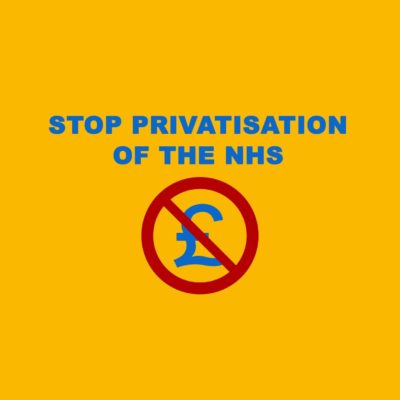NHS under threat: Integrated Care Systems and the forthcoming Health & Care Bill
Urgent action is needed to stop government plans that will fundamentally change the NHS and allow private companies an even bigger role.
While the public has been kept in the dark, the NHS in England has been fragmented into 42 areas that are now being turned into semi-independent “Integrated Care Systems” (ICSs).
ICSs integrate organisations: each ICS brings together NHS bodies (such as hospital trusts), local councils and others (potentially private companies) to take joint responsibility for delivering services within a fixed budget.
KONP strongly supports the integration of services where this improves patient care: many NHS staff work hard to achieve this. But ICSs are first and foremost about making the organisations within an ICS work together in order to reduce patients’ use of NHS services and save money.
Why we need to campaign (see also Scrap the Bill campaign)
At the moment, ICSs have no legal standing. However, the government has produced a White Paper as a prelude to a Health and Care Bill that will seek to legalise ICSs and introduce measures that we believe will change the very basis of the NHS.
KONP’s concerns about government plans, as suggested by the White Paper, include the following:
- The increased presence and influence of the private sector, including
- the possibility that representatives from private companies (such as Virgin) will have seats on ICS management Boards;
- the growing dependence of ICSs on a pool of approved companies for system development, on-going management and service provision;
- The greater use of digitalisation and digital services, meaning
- less face-to-face appointments with GPs, less continuity of care, de-skilling of the workforce and greater use of less qualified staff;
- increased access to confidential patient records by private companies with few safeguards.
- A shift in the principles underlying the NHS from the provision of comprehensive, universal care, based on need to the management of patient ‘demand’.
- Worse conditions for the workforce, including
- ‘flexible’ working, meaning staff may be expected to work for different organisations across an ICS;
- the risk of local pay and a threat to the national scheme (Agenda for Change) that ensures equal pay for equal work.
- Deregulation, meaning
- the loss of environmental, social and labour protections;
- the NHS remains a market, but becomes a deregulated one that’s more attractive to private companies and more open to corruption;
- the possible disbanding of regulatory bodies that oversee the conduct and competence of health care professions.
- Lack of accountability, including
- a reduced role for elected Local Authorities
- new powers for the Secretary of State to intervene in local decisions, and
- no accountability to the public.
(For more detailed information, see our section on Background materials)
Taking action
The government is about to publish a Health and Care Bill that was announced in the Queen’s Speech, and it’s expected to be rushed to its second reading. KONP will be providing an analysis of the Bill as soon as it’s published and then asking campaigners to move fast to write to MPs and Local Authority Councillors, as well as use our leaflets to let NHS staff and the public know what the Bill proposes.
Current campaign materials
The KONP ICS Working Group has produced a range of campaign materials on ISCs and the proposed Bill to download: including
- Health and Care Bill and what it means for the pay, terms and conditions of NHS staff (posted August 2021)
- Keep Our NHS Public on new Health and Care Bill 07.07.21
- a Letter to councillors or MPs
- Integrated Care Systems: The threat to the NHS, social care and public healthan article which can be used for newsletters, press releases
- Corporate bonanza for Integrated Care Systems leaflet, An A4 PDF leaflet aimed at those with some knowledge about the NHS and ICSs
- Stop the roll out of Integrated Care Systems in the NHS, A shorter, A5 PDF introductory leaflet.
- An A5 leaflet for NHS staff
- An A5 leaflet for patients
- Model motion, Labour Party
- Model motion, trade unions
- An ICS teach in providing background information for campaigners
Sign our petition to Stop ICS Roll Out in England
Please sign the petition and pass it on to others to sign, to Stop the Roll Out of ICS.
Background information
Information on ICSs
A) Information developed by the ICS Working Group in response to a consultation by NHS England:
- Integrated Care Systems Summary Briefing by Keep Our NHS Public, January 2021;
- Keep Our NHS Public’s objections to NHS England’s recommendations for changing the law to facilitate Integrated Care Systems, January 2021
- A three-part analysis of ICSs
- Part 1: Corporate Agenda for Integrated Care, particularly addressing the role and approach of multi-national corporates on NHSE’s Health Systems Support Framework (HSSF) that are increasingly being used in the development and management of ICS;
- Part 2. An alternative vision: achieving democratic accountability, by Keep Our NHS Public, January 2021 , addressing the lack of democratic accountability with ICSs;
- : Part 3. Social care: relationship to ICSs, by Keep Our NHS Public, January 2021, considers the threat to social care from ICSs.
B) Information about what the government’s White Paper means
- Keep Our NHS Public's submission to Health and Social Care Inquiry into the Government's White Paper proposals, May 2021
-
White Paper: power grab, sea change or cementing in the status quo?
-
2021 NHS White Paper: government seizes on the pandemic as an opportunity
- Patients4NHS - accountable care systems






